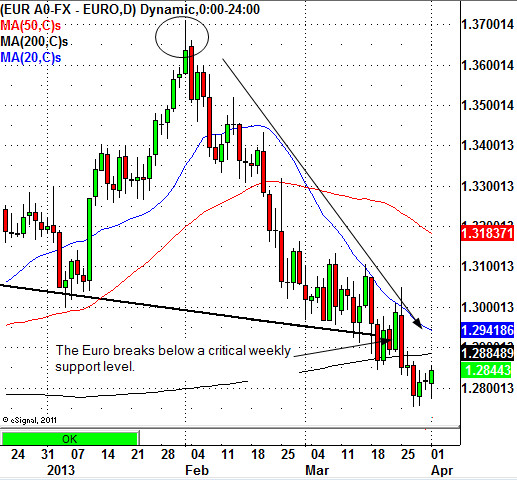Nearly each and every day there is a new report about another bank failure or bailout coming out of the European Union. The latest news has been about a bank levy on the Cyprus bank depositors with over €100,000 in an account. While Cyprus is a very small country, it is an international banking hub for many wealthy individuals. This is ultimately where the problem lies and it could be systemic to countries such as Italy, Spain, Portugal, Belgium, Lithuania, Greece, and others. So why do these countries stay in the European Union?
As long as troubled Euro-zone countries continue to receive bailouts why would they leave the union? Greece received several bailouts and may still need further money in the future. Spain, Greece, and Italy could actually be getting hurt by using the Euro as a currency. Has anyone ever visited these countries before the Euro was used? It was very inexpensive and the Euro has actually hurt tourism and exports for these nations.
Last week, the EUR/USD broke below the neckline of a a weekly chart inverse head and shoulders pattern. This is a bearish indication in the long term for the EUR/USD. Today, EUR/USD is trading higher on the trading session, however this small bounce is coming from a very oversold condition. So traders may not want to rush out this afternoon and short the EUR/USD. Traders will now want to watch for a potential bearish chart pattern to form and then look for further downside in the EUR/USD. Please remember, nothing in the market ever declines in a straight line so bounces will occur on the Euro. Ultimately, the Euro looks like it will decline further soon.
Some ways to play the EUR/USD are to use the CurrencyShares Euro Trust (FXE), and the ProShares UltraShort Euro (ETF) (EUO). Forex traders can both buy and sell EUR/USD at will. Some leading equities that could affect the action in the Euro will be the PowerShares DB US Dollar Index Bullish (UUP), and the Ishares MSCI Europe Financials Sector Index ETF (EUFN).
- English (UK)
- English (India)
- English (Canada)
- English (Australia)
- English (South Africa)
- English (Philippines)
- English (Nigeria)
- Deutsch
- Español (España)
- Español (México)
- Français
- Italiano
- Nederlands
- Português (Portugal)
- Polski
- Português (Brasil)
- Русский
- Türkçe
- العربية
- Ελληνικά
- Svenska
- Suomi
- עברית
- 日本語
- 한국어
- 简体中文
- 繁體中文
- Bahasa Indonesia
- Bahasa Melayu
- ไทย
- Tiếng Việt
- हिंदी
Is The Euro Broken?
Latest comments
Loading next article…
Install Our App
Risk Disclosure: Trading in financial instruments and/or cryptocurrencies involves high risks including the risk of losing some, or all, of your investment amount, and may not be suitable for all investors. Prices of cryptocurrencies are extremely volatile and may be affected by external factors such as financial, regulatory or political events. Trading on margin increases the financial risks.
Before deciding to trade in financial instrument or cryptocurrencies you should be fully informed of the risks and costs associated with trading the financial markets, carefully consider your investment objectives, level of experience, and risk appetite, and seek professional advice where needed.
Fusion Media would like to remind you that the data contained in this website is not necessarily real-time nor accurate. The data and prices on the website are not necessarily provided by any market or exchange, but may be provided by market makers, and so prices may not be accurate and may differ from the actual price at any given market, meaning prices are indicative and not appropriate for trading purposes. Fusion Media and any provider of the data contained in this website will not accept liability for any loss or damage as a result of your trading, or your reliance on the information contained within this website.
It is prohibited to use, store, reproduce, display, modify, transmit or distribute the data contained in this website without the explicit prior written permission of Fusion Media and/or the data provider. All intellectual property rights are reserved by the providers and/or the exchange providing the data contained in this website.
Fusion Media may be compensated by the advertisers that appear on the website, based on your interaction with the advertisements or advertisers.
Before deciding to trade in financial instrument or cryptocurrencies you should be fully informed of the risks and costs associated with trading the financial markets, carefully consider your investment objectives, level of experience, and risk appetite, and seek professional advice where needed.
Fusion Media would like to remind you that the data contained in this website is not necessarily real-time nor accurate. The data and prices on the website are not necessarily provided by any market or exchange, but may be provided by market makers, and so prices may not be accurate and may differ from the actual price at any given market, meaning prices are indicative and not appropriate for trading purposes. Fusion Media and any provider of the data contained in this website will not accept liability for any loss or damage as a result of your trading, or your reliance on the information contained within this website.
It is prohibited to use, store, reproduce, display, modify, transmit or distribute the data contained in this website without the explicit prior written permission of Fusion Media and/or the data provider. All intellectual property rights are reserved by the providers and/or the exchange providing the data contained in this website.
Fusion Media may be compensated by the advertisers that appear on the website, based on your interaction with the advertisements or advertisers.
© 2007-2025 - Fusion Media Limited. All Rights Reserved.
